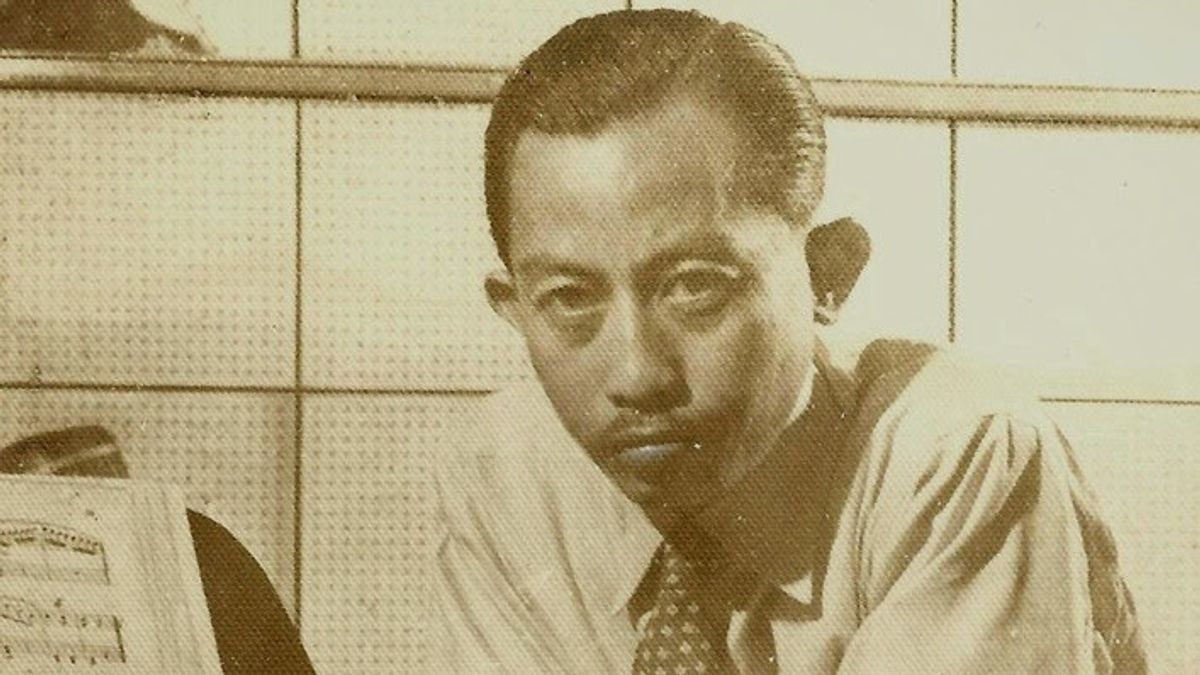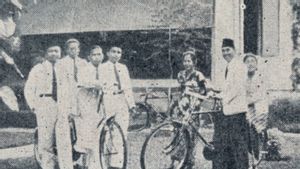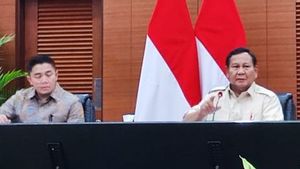JAKARTA – Today's history, 108 years ago, May 11, 1914, the Indonesian music maestro Ismail Marzuki was born. The actions of Betawi children born in Kwitang are full of inspiration. He became the perfect embodiment that the struggle is not just taking up arms. Music can also be used as a tool of struggle.
Ismail's famous songs were able to ignite the spirit of the freedom fighters to fight against the invaders. It was his services that made him a national hero.
Perhaps Ismail Marzuki will agree with the statement: hobbies are contagious. His father, Marzuki, has a hobby of listening to music every day. The father even has a "talking machine" gramophone and LPs are quite a lot. Unexpectedly, his hobby of listening to music spread to Ismail. Every time music is played, Ismail is happy not to play. However, Ismail's pleasure is not only listening to music. He was actually challenged to play music.
He tried to play music by himself. Ismail's persistence in playing musical instruments has the full support of his father. As much as possible, Ismail's father bought a variety of musical instruments for his son. From guitar to saxophone. These efforts succeeded in making Ismail develop his talent in the world of music. Moreover, his father came from affluent circles.

Ismail's musical ability is increasing. He is able to change song after song from various genres. The flight hours have increased. His musical activity was able to penetrate the radio, film, to the stage of Societeit, an exclusive club at that time. Anyway, the Dutch colonial period was used as a medium for developing musical talent.
Everything changed only during the Japanese colonial period. At first he was like other Betawi children who had thought of Japan as a savior. However, over time the Japanese character became visible. He began to change the direction of his music. From a tool of gaining popularity to being a tool of struggle.
“A year after Japan occupied Indonesia, only then did the people know that the new invaders were more vicious. Ismail also noticed. In his own way he fought. He composed Whisper of the Motherland, followed by Indonesia the Land of Heritage. The song was widely broadcast over the radio. Then Sumitsu san, the head of the Seidenbu (Propaganda Agency) reported Ismail to the Kempetai, so Ismail was summoned by the Japanese Military police to be interrogated about the song. He was released after being threatened.”
"Ismail was desperate. The song of the struggle of the brave officers was made, together with marches to ignite the spirit of independence, especially for Peta (Defenders of the Homeland). He didn't fight alone. The heroic and patriotic composer Cornel Simanjuntak composed Forward Undaunted and Kusbini produced For You the Country. In October 1944, Ismail wrote a song that expressed his love for the homeland, namely "Rayuan Pulau Kelapa"," said Ahmad Naroth in the book Ketoprak Betawi (2000).

Gait that made the name of Ismail Marzuki skyrocketed among the freedom fighters. The echoes of Ismail Marzuki continued to be heard even though he died on May 25, 1958. His services are unforgettable.
He was also awarded the title of national hero in 2004. Even so, his name was immortalized by the Governor of DKI Jakarta from 1966-1977, Ali Sadikin as the name of the Taman Ismail Marzuki (TIM) art complex. A place that became the rendezvous of Jakarta artists.
"A number of Betawi figures have suggested to the provincial government (Pemprov) of DKI to immortalize Ismail Marzuki, a Betawi-born fighter composer, as the name of one of the streets in Jakarta. They think that the composer who has composed more than 200 songs deserves an award. Governor Ali Sadikin in the early 1970s did not immortalize the name Ismail Marzuki for the center of arts and culture in Cikini, Central Jakarta," said Alwi Shahab in the book Saudagar Baghdad from Betawi (2004).
The birth of the composer Ismail Marzuki on May 11, 1914, became an important historical record today in Indonesia.
SEE ALSO:
The English, Chinese, Japanese, Arabic, and French versions are automatically generated by the AI. So there may still be inaccuracies in translating, please always see Indonesian as our main language. (system supported by DigitalSiber.id)


















